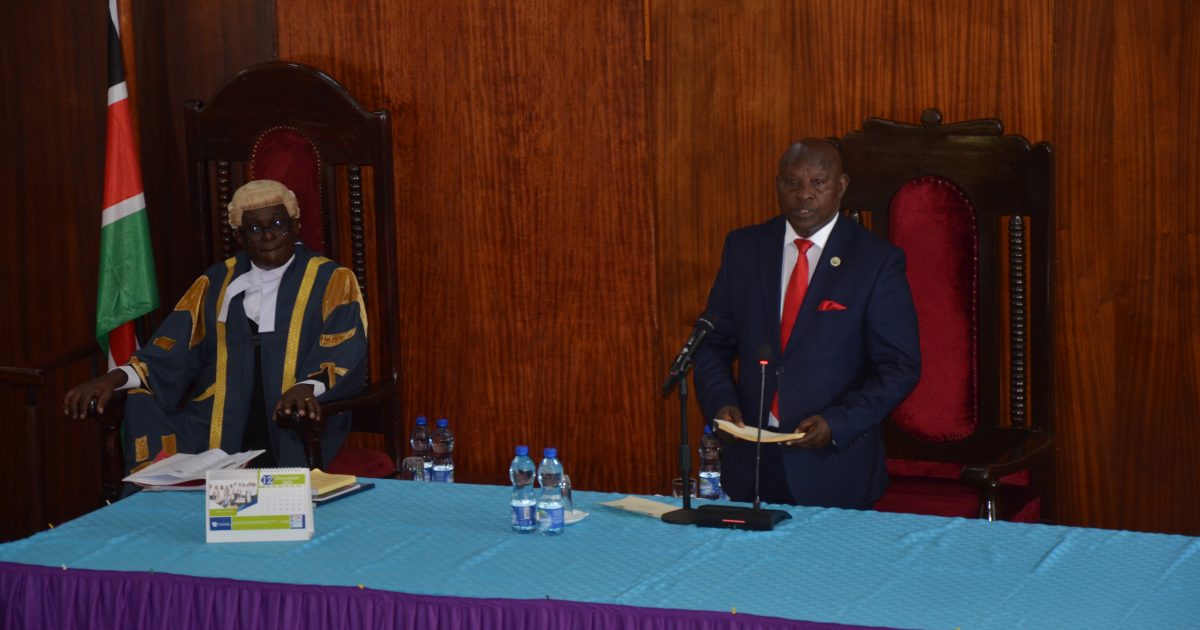A report by the Controller of Budget (CoB) shows Transport, Public Works and Infrastructure ranked high in absorption of development funds in Nyeri County during the first quarter of the 2023/2024 fiscal year.
The Department which posted an absorption rate of 9.5 percent of allocated funds was followed closely by the County Public Service Administration and Youth Affairs at 7. 6 percent.
During the same period, the Nyeri County Assembly recorded the highest percentage of recurrent expenditure to budget ratio at 29.2 percent closely followed by the health docket.
Overall, the lowest spender in terms of recurrent budget was the office of the County Attorney at 6.9 percent.
“Analysis of expenditure by the Department of Transport, Public Works and Infrastructure recorded the highest absorption rate of development budget at 9.5 percent, followed by the Department of County Public Service, Administration and Youth Affairs at 7.6 percent,” reads part of CoB, Dr Margaret Nyakang’o.
During the first three months of the 2023/2024 financial year, the County received a total of Sh551.25 million as equitable share revenue and an additional Sh229.24 million as Facility Improvement Fund (FIF).
The County also managed to raise Sh 108.11 million as its own source revenue bringing the total to Sh888, 609,370.
However, according to the CoB report, the county did not budget on the FIF despite having received the money during the period under review.
On development and recurrent expenditures, the report shows the county Executive spent Sh595.65 million on employee compensation with Sh 89.25 million going to development.
However, expenditure on employee compensation recorded a decrease from Sh 892.42 million reported in a similar period a year earlier.
“In the first three months of FY 2023/2024 expenditure on employee compensation was Sh636.93 million, or 71.7 percent of the available revenue which amounted to Sh888.61 million.
This expenditure represented a decrease from Sh 892.42 million reported in the first quarter of FY 2022/23. The wage bill included Sh362.67 million paid to health sector employees translating to 57 percent of the total wage bill,” continues the report.
On sitting allowances, the report shows the County Assembly drew a total of Sh 5.12 million on committee allowances for the 42 Members and the Speaker against the annual allocation of Sh25 million.
Out of this amount, each lawmaker was to receive an average of Sh40,610 as a sitting allowance.
The House has a total of 22 Committees.
On travel, the County Assembly spent a total of Sh 48.69 million on domestic travel while the executive spent Sh 37.27 million during the period under review.
While the county spent a total of Sh 15.35 million on foreign travel for the elected leaders, it was the County Assembly that accounted for the lion’s share of this amount after spending Sh10.34 million compared to the executive that spent Sh5.01 million.
In her findings, Dr. Nyakang’o has advised the County government to address the issue of pending bills which stood at Sh 71.72 million as at September 30 2023.
She also recommended the county government to address the issue of own-source revenue to help in meeting the county’s budgetary obligations.
She noted the big discrepancy between the County’s underperforming own-source revenue of Sh108.11 million against an annual projection of Sh800 million which she termed as too low.
The County has also been urged on the need to shift its payroll to the Integrated Personnel and Payroll Database (IPPD) system while processing salaries for employees and to prioritize planned development programmes to enable the public realize proposals made during public participation forums.
“The County leadership should address the pending bills situation to ensure genuine bills are paid promptly in the remaining financial year. A payment plan should be provided at the beginning of the financial year. The government requires that salaries be processed through the IPPD system, and the County is advised to fast-track the acquisition of Unified Personnel Numbers for their staff. The County Public Service Board should regulate staff engagement on contract and casual workers as provided under Section 74 of the County Government Act 2012. Further, there should be strict compliance with the approved staff establishment,” she recommends.
Nyeri expects to receive a total of Sh6.49 billion (80.6 percent) as equitable share revenue during the current financial year and an additional Sh762.95 million as conditional grants.
In terms of its own source revenue, the county hopes to generate a total of Sh 800 million from local collections to help plug gaps in financing its Sh 8.05 billion annual budget which was approved by lawmakers last year.
During his County address in November last year, Governor Mutahi Kahiga listed improvement in agriculture, education, health, and infrastructure as some of his key achievements during his first year in office.
The Governor also said the county had managed to clear all pending bills owed to suppliers and attributed this achievement to sound fiscal discipline in his administration.
He also said the county had managed to retain the statutory requirement of 30 percent of the total budget for development purposes with the county managing to absorb 96 percent of monies disbursed by the Treasury.
“We have ensured and sustained expenditure and fiscal discipline, which has given the county a clean bill of health in the absorption of the annually allocated resources from the national treasury as well as the externally disbursed resources, an average of 96 percent annually. We also ensured that the development budget is retained according to the statutory requirement of 30 percent of the total budget. Additionally, I must attest at the outset that Nyeri County has cleared all committed pending bills owed to our supplies,” he told the lawmakers.
By Samuel Maina





